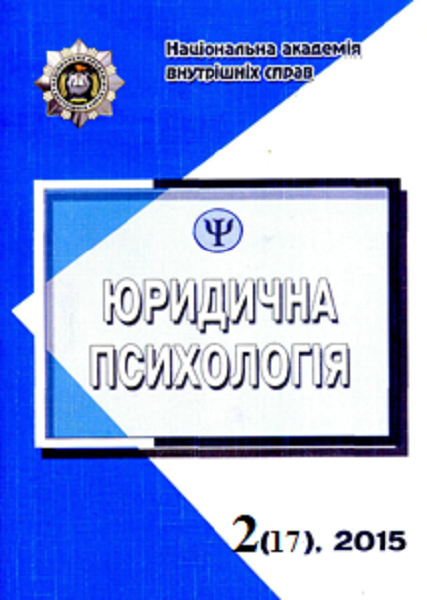Features of Viable Intents of Law Enforcement Officers and Psychological Characteristics
Keywords:
functions of viable intents, policemen, personal, viable, social object
Abstract
The author of the article classified according to the types of policemen viable intents their functions and psychological characteristics. According to the author, the types of viable intents include personal, viable, social and objective. In turn, these types consist of certain types of viable intents. Thus, the author considers as viable the following types: professional, educational, creative, household; social, subjective attitude and subjective interaction; objective: physical, inner; personal: egocentric, intrapsychological, physiological, health safety, general cultural. Roles and values types are identified for individual defined functions. It appears that for the above mentioned types, types of viable intents should clarify and expand the boundaries of their functions in accordance with the role and value that they provide. Consequently, personal viable intents of police officer are transferred in the following functions: self-adaptive, reflective, self-regulatory, self-acceptance. The functions of social viable intents include: epistemological, perceptual, emotional, adaptive, integrative, methodological, regulatory. Viable police officer intents defined in the following functions: epistemological, acmeological, value-evaluation, self-fulfillment, emotional, adaptive, operating, safety, consumer, creative. The functions of the object of viable intents include: epistemological, emotional, value-evaluative, creative, consumer, protective (according to author). It is emphasized that the viable intents determine the internal integrity of police officers, a picture of their personal life. They also depend on the intents and how certain police officers are consistent with other intents and how easy it is they change it.Downloads
Download data is not yet available.
Abstract views: 187 PDF Downloads: 101
Issue
Section
Psychological support of law enforcement
- Authors reserve the right to authorship of their own work and transfer to the magazine the right of the first publication of this work under the terms of the Creative Commons Attribution License, which allows other persons to freely distribute published work with mandatory reference to authors of the original work and the first publication of an article in this magazine.
- Authors have the right to enter into separate additional agreements on non-exclusive dissemination of the work in the form in which it was published in the journal (for example, to post an article in the institution's repository or to publish as part of a monograph), provided that the link to the first publication of the work in this journal is maintained.
- The journal's policy allows and encourages the posting of articles by authors on the Internet (for example, in electronic storehouses of institutions or on personal websites), both before the submission of this manuscript to the editorial office and during its editorial processing, as this contributes to the creation of a productive scientific discussion and positively affects the efficiency and dynamics of citing the published work.




